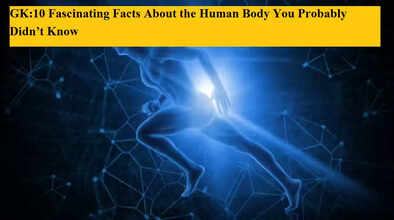GK:10 Fascinating Facts About the Human Body You Probably Didn’t Know

The human body is one of the most complex creations of nature. From school biology lessons, we learn about organs, cells, and functions, yet even scientists admit there’s always more to discover. Interestingly, some everyday processes inside our bodies are far more surprising than we imagine. For instance, did you know that the blood vessels in your body are so long that if stretched end to end, they could circle the Earth more than twice?
Here are 10 amazing facts about the human body that will leave you stunned and might even help you in competitive exams where biology and science GK questions are often asked.
1. How much saliva do we produce daily?
Our salivary glands are constantly at work. According to the National Library of Medicine, a healthy human produces 0.5 to 1.5 liters of saliva every single day. Saliva not only helps in digestion but also protects teeth and keeps the mouth moist.
2. Are tongue prints unique like fingerprints?
Yes! Just like fingerprints, every person has a unique tongue print. No two individuals share the same pattern, making it another way to identify humans.
3. Which part of the eye is donated during eye donation?
In eye donation, only the cornea is transplanted. This transparent front layer of the eye allows light to enter and plays a critical role in vision. A cornea transplant can restore sight to a person who is blind due to corneal damage.
4. How many nerves connect the eyes to the brain?
Vision is a highly complex process. According to Optometrics.org, over one million nerve fibers connect each human eye to the brain, transmitting visual signals instantly.
5. How long are the blood vessels in the human body?
This fact is mind-blowing. The Texas Heart Institute states that if you line up all the blood vessels in a human body, their total length would be about 60,000 miles (96,000 km). That’s long enough to wrap around the Earth more than twice!
6. How quickly does the brain die without oxygen?
The brain is highly dependent on oxygen. According to MedlinePlus, brain cells begin to die within 4 to 6 minutes of oxygen deprivation. That’s why doctors declare clinical death if breathing and heartbeat stop for more than a few minutes.
7. How much oxygen does the brain consume?
Despite being only about 2% of body weight, the human brain consumes 20% of the body’s total oxygen supply. This shows just how energy-intensive our thinking organ really is.
8. Are both lungs the same size?
No. The right lung is divided into three lobes, while the left lung has only two lobes. The left lung is slightly smaller because the heart occupies space on that side of the chest.
9. How long is the small intestine?
Your small intestine is surprisingly long—about 23 feet (7 meters) on average, which is much longer than your height. It plays a key role in absorbing nutrients from food.
10. How strong is stomach acid?
The stomach produces hydrochloric acid (HCl) to aid digestion. This acid is so strong that it can dissolve metals like razor blades. However, a protective mucus lining inside the stomach prevents it from digesting itself.
Conclusion
The human body is nothing short of a miracle. From producing liters of saliva every day to housing blood vessels long enough to circle the Earth, every detail reveals just how intricate and powerful our system is. Learning these facts not only deepens our understanding of biology but also reminds us of the incredible science behind our existence.

